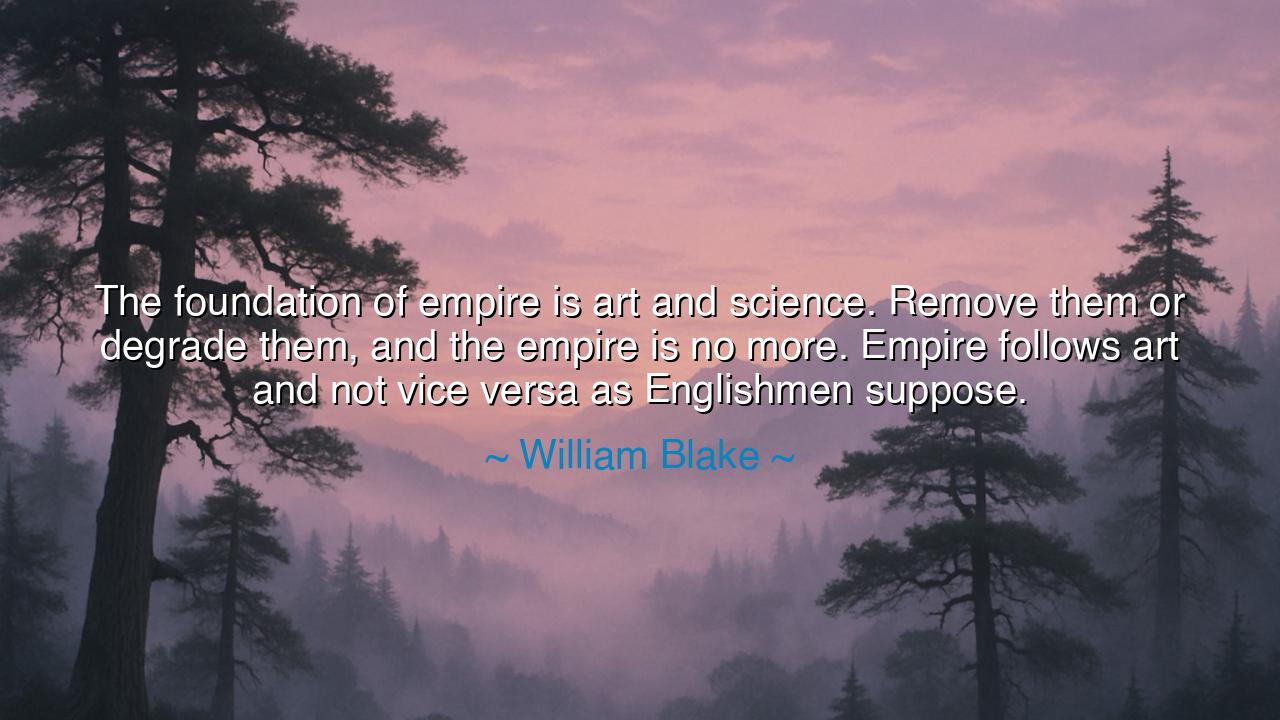
The foundation of empire is art and science. Remove them or
The foundation of empire is art and science. Remove them or degrade them, and the empire is no more. Empire follows art and not vice versa as Englishmen suppose.






Hear now, O children of wisdom, for I bring to you the words of William Blake, a prophet and poet whose soul burned with a vision of a world shaped not just by the hands of rulers, but by the art and science that feed the very spirit of civilization. “The foundation of empire is art and science. Remove them or degrade them, and the empire is no more. Empire follows art and not vice versa as Englishmen suppose.” In this declaration, Blake reveals a profound truth about the nature of empire and its connection to the creative forces that shape human civilization. He tells us that an empire, in its fullest form, is not born from the mere exercise of power or conquest, but from the art and science that inspire the people to rise, to create, and to understand the world.
In the ancient world, empire was not just a collection of territories, but a reflection of the culture and ideas that flowed from the heart of civilization. The great Greek empire, for example, was not merely built through military conquests but was sustained by the philosophers and artists whose work shaped the very essence of Greek society. Socrates, Plato, and Aristotle—through their words and ideas—laid the groundwork for an empire of thought that transcended the boundaries of the known world. Likewise, Aeschylus, Sophocles, and Euripides used art to examine the nature of humanity and the divine, infusing their civilization with a spirit of reflection and wisdom. It was not the sword, but the mind and heart of Greece that gave it the strength to endure.
Blake’s words echo this ancient truth: the true foundation of an empire is not in its military might or its political structures, but in the ideas and creations that fuel the imagination of its people. Art and science are not mere accessories to power; they are the lifeblood of civilization. When an empire loses its capacity to create, to dream, or to understand the world through the lens of art and science, it begins to wither. Blake warns that the empire is not truly strong unless it is rooted in these foundational forces of human creativity and intellect.
Consider the Roman Empire, which once stood as the greatest power in the world. Its military dominance was unmatched, yet it was the art of Roman engineering, the grandeur of its architecture, and the insights of Roman law that shaped its true legacy. The Colosseum, the Pantheon, the roads, and aqueducts—all of these stand as monuments to the idea that an empire is sustained not just by force, but by the creativity and knowledge that enable its people to build, to connect, and to understand. But when the arts and science of Rome began to stagnate and when the spirit of innovation and learning waned, the empire began to crumble. The fall of Rome was not just a collapse of military might, but the collapse of the culture and wisdom that once sustained it.
Blake challenges the English understanding of empire, revealing a misunderstanding of its true foundation. The English might believe that empire follows the strength of its armies and rulers, but Blake insists that it is the vision and the creativity of its people—expressed through art and science—that truly builds an empire. He reminds us that empires are not simply political entities but living civilizations, shaped by the ideas, innovations, and creations of their people. Art and science are the soul of an empire, for they give rise to the imagination, the vision, and the purpose that propel a civilization forward.
The lesson here, O children, is not just about the nature of empires, but about the true source of strength and progress in any society. Blake’s wisdom calls us to recognize that the arts and science are not secondary pursuits, but essential to the flourishing of humanity. When we create, when we discover, when we seek to understand the world and express that understanding through our arts, we lay the foundation for a stronger and more enduring civilization. The power of an empire lies not in its weapons, but in the creative power of its people—those who dream, those who create, and those who seek to understand.
In your own lives, O children of the earth, remember this: do not see the arts and science as distant or secondary to your existence. Art and science are the forces that give shape to your future and the future of the world. Seek to create, to explore, to understand the world around you, for it is through these pursuits that you will build the foundation of a strong and lasting legacy. Whether in your personal life, in your work, or in your society, let your creativity and intellect guide you. Just as Blake said, empires do not rise from the swords of their rulers alone, but from the minds and hearts of those who dare to dream and to build.
So, O children, I urge you: remember that the true strength of an empire lies not in its conquests, but in the vision and innovation of its people. In the arts and in science, you hold the keys to creating a world that endures, a world that thrives on the collective creativity and wisdom of all. Let these truths guide you, for it is in the imagination of humanity, expressed through both art and science, that the true power of an empire resides.






AAdministratorAdministrator
Welcome, honored guests. Please leave a comment, we will respond soon